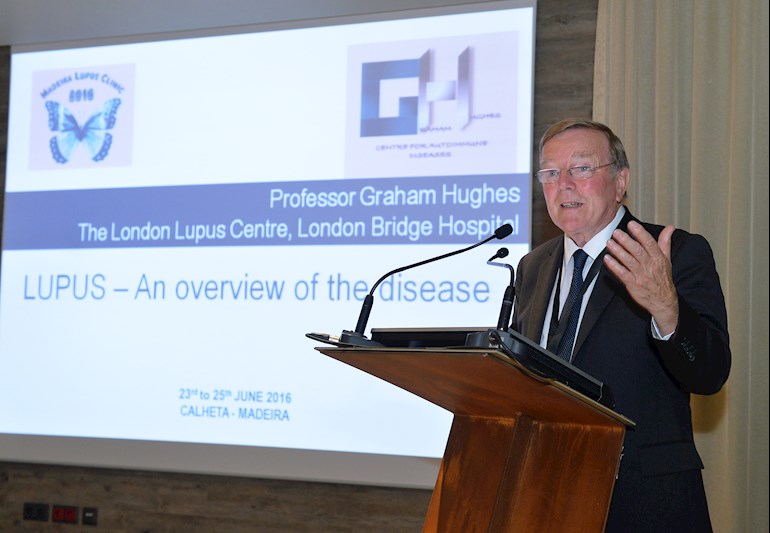As you are aware to help with communication and awareness raising, both in the UK and across Europe and beyond, our name change of Sticky Blood Hughes Syndrome, still clearly has Professor Graham's Hughes name in our description/banner. Some medical staff know this disease as Antiphsopholipid Syndrome/APS etc, which is also included.
This obvious use for the right reasons of Professor Graham Hughes' name, will never change, as without him, and his continuing excellent work, my family for one, and many other patients may have been left in the dark ages, along with countless others. I enclose here a recent photograph of him in Portugal and the write up to go with it. Thank you Professor Graham Hughes for your excellent medical advice, decades of work, and your continuing training of other medical staff! Thank you for all those incredible years so far, your help is second to none.
MaryF
_____________________________________________________________________________________
For immediate release
HCA Healthcare UK’s Professor Graham Hughes honoured with clinic in Portugal
On Thursday 23rd June, a new clinic for lupus and Hughes Syndrome patients was opened in honour of Professor Graham Hughes, Head of The London Lupus Centre at London Bridge Hospital (part of HCA Healthcare UK).
The clinic in Madeira – named “The Graham Hughes Centre for Auto-immune Diseases” – was dedicated to Professor Hughes in honour of his lifelong commitment to research and treatment of lupus and his discovery of the related condition Hughes Syndrome, now recognised as the most common, treatable cause of recurrent miscarriage.
Also present were the mayor and dignitaries from Madeira, doctors from all over Portugal, and lupus specialists from as far afield as the USA, Barcelona, Israel and Paris.
Hughes Syndrome, sometimes known as ‘sticky blood’, was discovered in 1983. It is a condition in which the blood has an increased tendency to clot or to ‘sludge’, and can affect any part of the body, although two organs commonly affected are the brain and – in pregnancy – the placenta.
Brain symptoms range from migraine, stroke and memory loss to ‘atypical multiple sclerosis’, whilst clotting in the placenta can lead to poor foetal growth and a tendency to miscarriage, with some women suffering a dozen or more miscarriages.
Professor Hughes said: “It is a great honour to be recognised, but most of all I am delighted that the opening of this clinic will see more patients receiving life changing treatment in this part of the world.
“I see many people struggling with lupus and with Hughes Syndrome and, for women who want to have children, it can seem a debilitating condition. But the good news is that it is easily treatable with anticoagulation medication and more and more patients now have access to the treatments they need.”
PHOTO: Professor Hughes delivers a speech to mark the opening of The Graham Hughes Centre for Auto-immune Diseases in Madeira, Portugal
